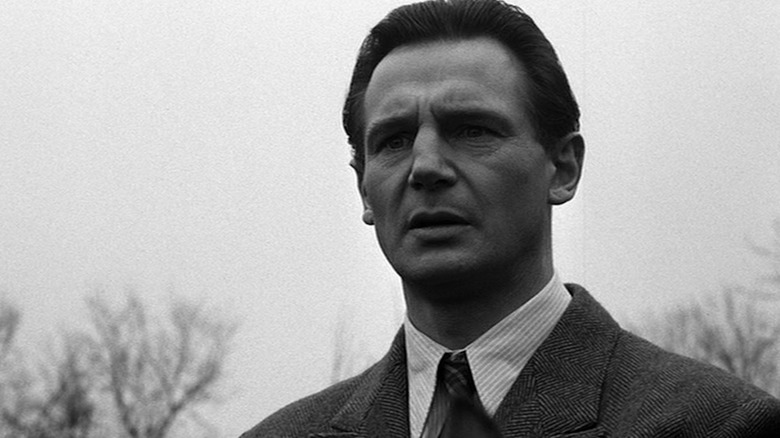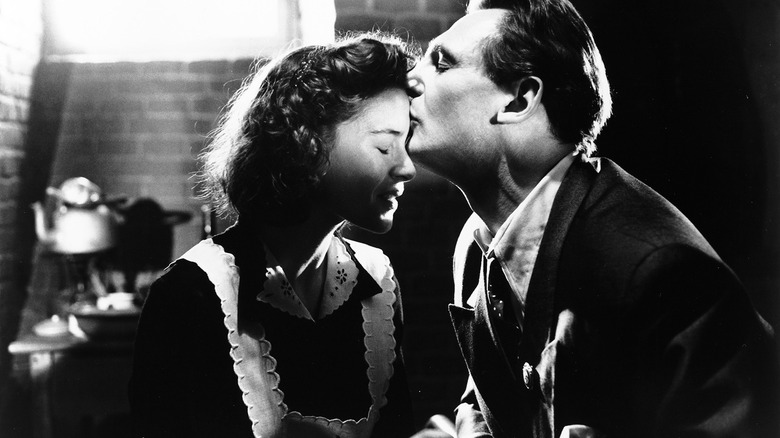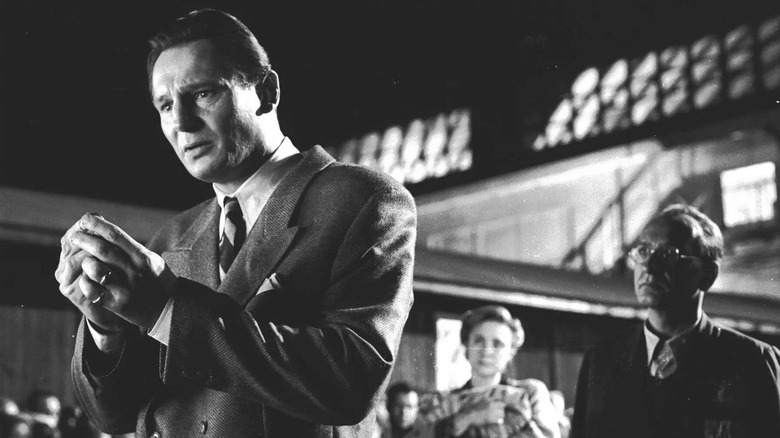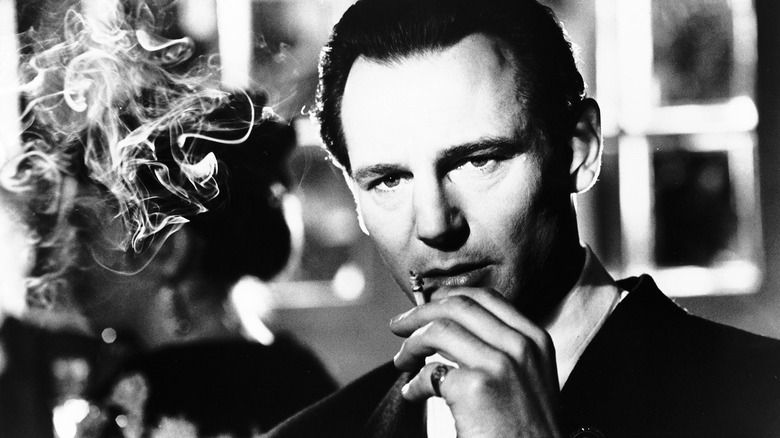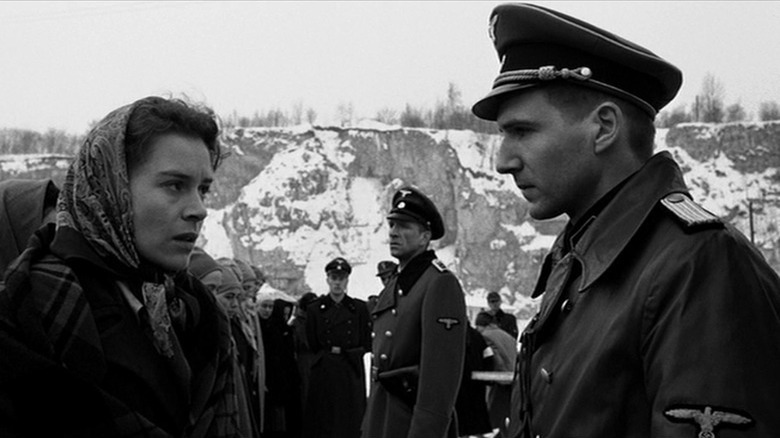Legendary Director Billy Wilder Asked Steven Spielberg To Let Him Direct Schindler's List
World-renowned director Steven Spielberg was at the height of his career when he made the Oscar-winning film "Schindler's List," but he wasn't the only filmmaker who was interested in adapting the novel of the same name for the silver screen. The acclaimed director Billy Wilder, an auteur of classic Hollywood cinema who penned and directed such renowned films as "The Apartment" and "Sunset Boulevard," was also vying for the rights to turn this story into a movie. However, by the time Thomas Keneally's evocative historical novel was published in 1993, Wilder's career was already winding down.
For a long time, Wilder enjoyed one of the most prosperous careers in Hollywood. His Oscar-nominated 1944 film "Double Indemnity" is considered the signal film of noir cinema and the model of the femme fatale trope. After Wilder's smashing success "Sunset Boulevard" earned three Oscars in 1951, he quickly went on to release several star vehicles — first for Kirk Douglas in "Ace in the Hole," then both Humphrey Bogart and Audrey Hepburn in "Sabrina," and soon after Marilyn Monroe in "The Seven Year Itch." He released a steady stream of films throughout the '50s, sealing it off with "Some Like it Hot" in '59 and "The Apartment" in 1960, with six Oscars won between them.
Unfortunately for Wilder, the Hollywood studio system underwent drastic changes in the 1960s, and between the dissolution of the Hays Code and declining box office sales, Wilder and his producers failed to keep up with the public's taste. The problem with defining a cultural moment is that moments are fleeting and, once gone, it's adapt or die. Wilder's films were received with less and less positive reception through his final effort, "Buddy, Buddy," in 1981, a rather depressing comedy about suicide featuring aging film stars Jack Lemmon and Walter Matthau.
Wilder and Spielberg met at MGM
Wilder is far from the only filmmaker who has fallen out of touch in his old age. Woody Allen was one of the most prolific filmmakers in America for years, writing, directing, and starring in hit films across several decades. His recent work, however, has had an abysmal critical reception — despite featuring star-studded casts with the likes of Timothée Chalamet and Owen Wilson. Brian De Palma was cranking out hits in the '70s and '80s like "Scarface," "Carrie," and "Dressed to Kill." However, his two most recent films, "Domino" led by "Game of Thrones" alum Nikolaj Coster-Waldau, and "Passion" starring Rachel McAdams, have been critical and financial flops.
It was at this declining point in Wilder's career that he became acquainted with Spielberg, a rising star who was working on his 1982 film "E.T. the Extra-Terrestrial" and writing the horror film "Poltergeist," released the same year. Wilder was working at MGM as a script consultant and feeling rather unfulfilled.
"Billy felt he was wasting his life," Spielberg revealed in a 2024 interview with The Hollywood Reporter. "We would have lunch often in the commissary, and Billy would say, 'I just cannot get a film off the ground anymore. Whatever worked for me for 30 years is not working anymore. The humor is different. I read these scripts, make some notes, give ideas, and my ideas are ideas that would've been brilliant in the 1940s and '50s, but nobody's accepting them today.'"
But it wasn't until several years later that Spielberg and Wilder would meet again and have a conversation that still haunts the younger director to this day, more than two decades after Wilder's death.
Wilder asked Spielberg to produce and let him direct
Before Spielberg made "Schindler's List," he had a very difficult conversation about the film with Wilder. The "Sunset Boulevard" director was an Austrian Polish Jew that fled an increasingly hostile Europe in 1934 and lost many members of his family in the Holocaust. Spielberg continued:
"[Wilder] came over to Amblin and up to my office, and he said, 'I just read a book and found out you own it, Schindler's List. This is my experience before I came to America. I lost everyone over there. I need to tell this story, and I hear you own the rights. Will you let me direct this and you can produce it with me?' And I didn't know what to say except to tell him the truth. I said, 'Billy, I'm leaving for Krakow in three weeks. The whole film's been cast. All the crew's been hired. I start shooting at the end of February.' Billy couldn't speak, and then I couldn't speak, and I just reached my hand out and Billy took my hand."
Although Spielberg understood that the project was deeply personal to Wilder, it was far too late for him to help. The "Jaws" director had already set all the wheels in motion, and too many people were relying on the production to take place as planned. Wilder might not have been in the prime of his career, but Spielberg still recognized the director's genius and knew how personal the story was to him. If it had been within his power (and reason) to hand the story over, he probably would have. Sadly, it was too close to production, and thus out of his hands.
It was too late for Wilder to step in — but was it for the better?
There's no way for us to know who would have handled "Schindler's List" more effectively. Clearly Spielberg did a good job, but Wilder's lived experience may have somehow imbued the film with even more truth. However, since studio executives had lost faith in Wilder, it could have suffered from a smaller budget and/or poor casting. Audiences, too, had lost faith in the aging director, which could have resulted in a film of far less cultural significance.
Certain filmmakers, like Quentin Tarantino, feel that filmmaking is a "young man's game," as he explained in a 2012 interview with The Hollywood Reporter. The director specifically named Wilder's final film, "Buddy, Buddy," as an example of his worst fear as a filmmaker.
"To me, it's all about my filmography, and I want to go out with a terrific filmography," he explained. He believes that every film a director makes factors into their overall "grade-point average," and that every "one of those out-of-touch, old, limp, flaccid-d*** movies costs you three good movies as far as your rating is concerned."
Tarantino recalled seeing incredible films by Howard Hawks and Billy Wilder as a kid and picking out another film from their oeuvre at random. His goal, he said, was for a child to be able to blindly select any of his films and get something up to par with his best work.
"I have to keep them wanting to go back for more," the "Pulp Fiction" director continued. "They can't grab 'Buddy, Buddy!' They can't grab 'Buddy, Buddy!' It can't — that can't happen!"
In the end, it might be a good thing that "Schindler's List" wasn't in Wilder's hands past his prime. Then again, it could have saved "Buddy, Buddy" from being his farewell to filmmaking, or even bumped up his filmography's grade-point average, so to speak.
Wilder said the best director won in the end
Wilder was understandably disappointed that he didn't get to direct "Schindler's List" himself, but that didn't stop him from enjoying the film. Although he admitted that he wanted "very much" to make the film "as a memorial to most of my family, who went to Auschwitz," he believes that Spielberg handled the story beautifully, he told Variety in 1993.
"They got the best," the "Some Like It Hot" director continued. "They couldn't have gotten a better man. The movie is absolutely perfection." He added that he would write Spielberg a "long letter" expressing his feelings about the film. Wilder was hoping to make this particular war movie his "adieu" to the cinema, and it's a shame that he never got the chance to return to his place behind the camera again.
Not all of Wilder's films are of equal caliber, but despite his lesser works towards the end of his career, he remains one of the most prolific and accomplished filmmakers of all time. Few directors can boast quite as many Oscar wins and nominations on quite so many films. He had acclaimed work in every genre, from romantic comedy to murder mystery to psychodrama. It's unfortunate he didn't get to direct a story that was so close to his heart, but he still got to see it successfully brought to life on the big screen by a young filmmaker he trusted, and in that way, a sad story still had a happy ending.
